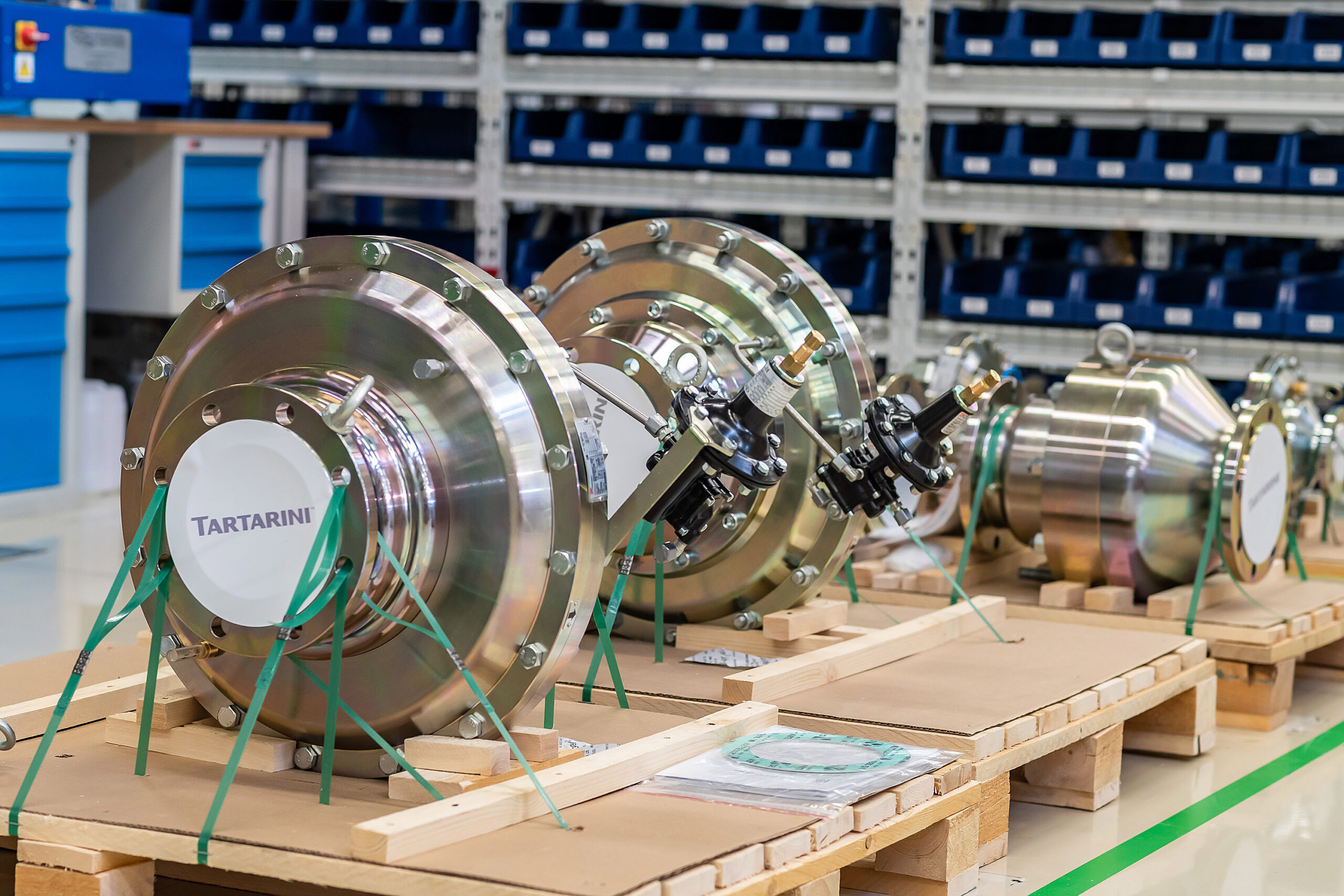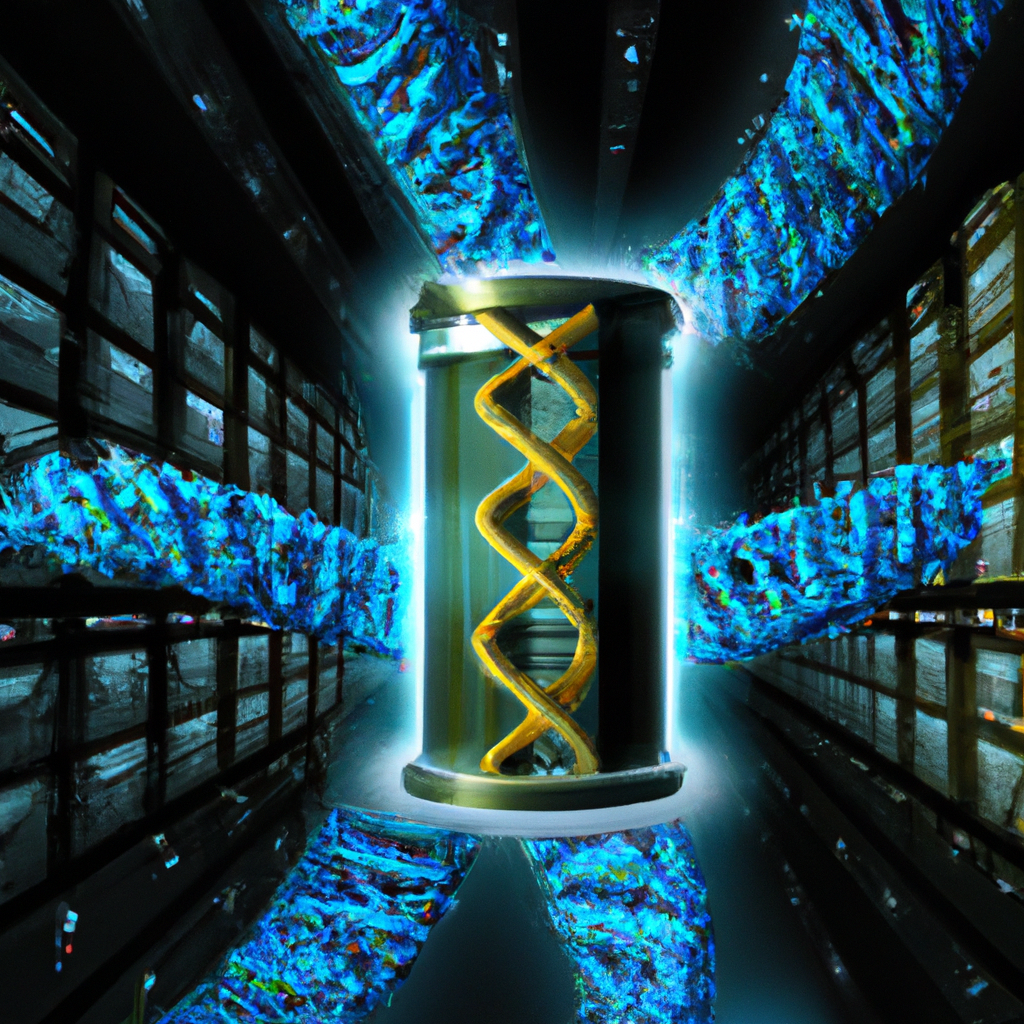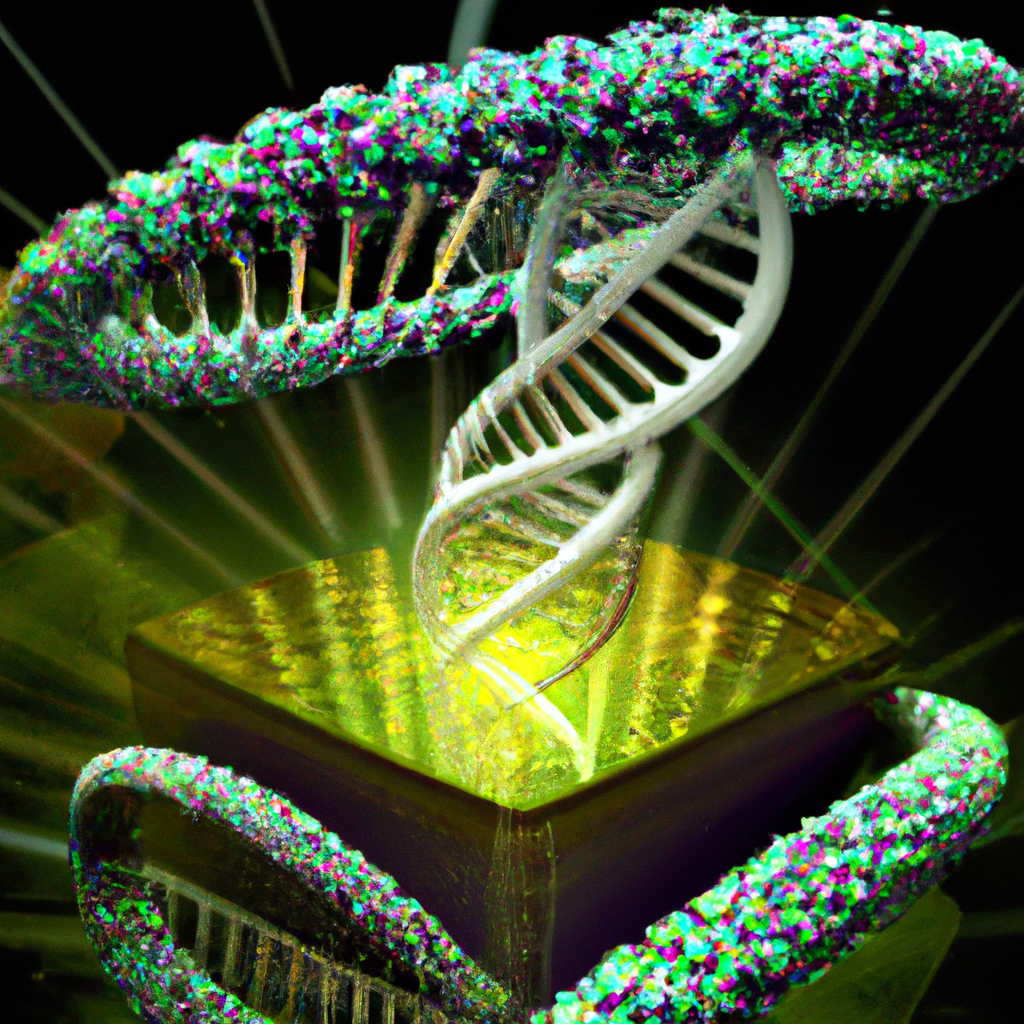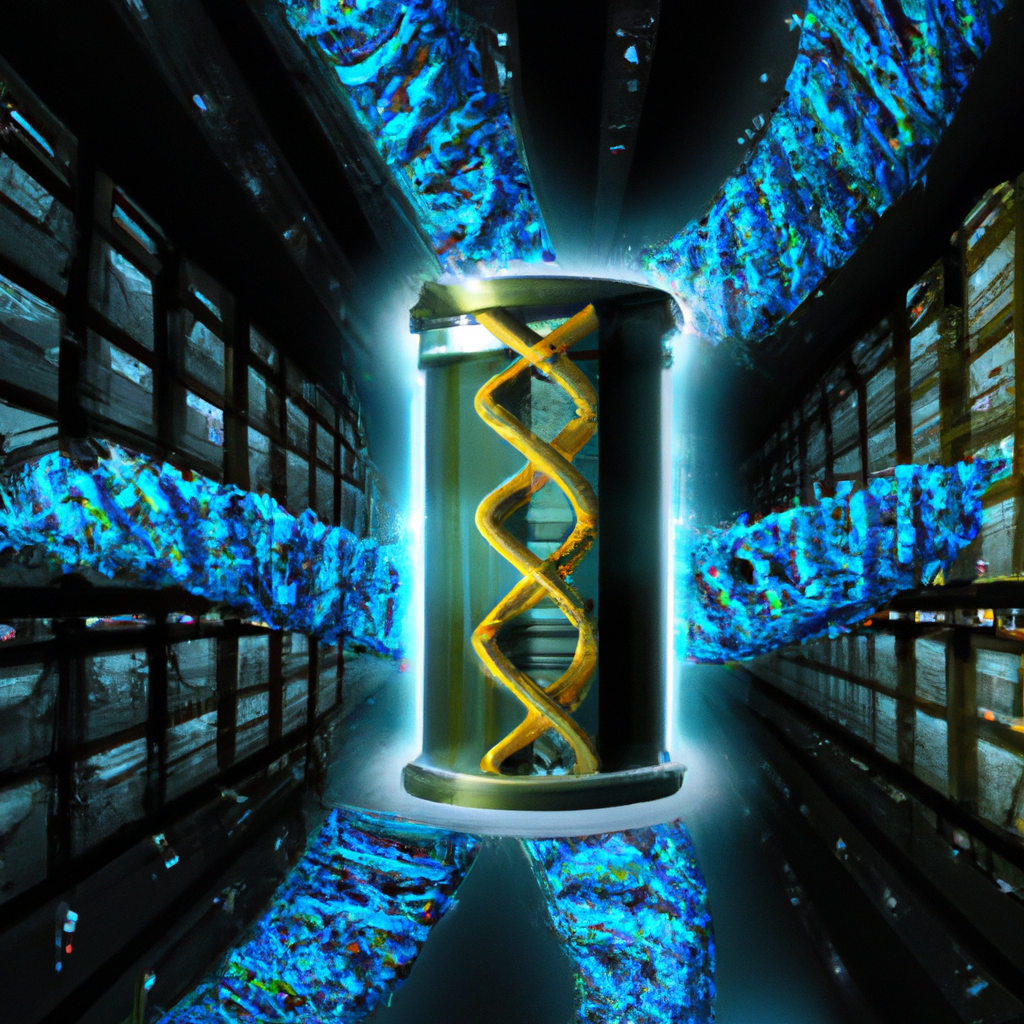In an era where data storage needs are constantly evolving and expanding, scientists and researchers are turning to an unlikely solution: DNA. DNA data storage is emerging as a revolutionary technology that has the potential to store massive amounts of information in a compact and durable format. With the ability to preserve data for thousands of years, DNA data storage offers a promising solution to the growing problem of information preservation. This article explores the exciting world of DNA data storage and why it could be the future of high-capacity information storage.
Understanding DNA Data Storage
Concept behind DNA data storage
DNA data storage is a revolutionary method of preserving and storing digital information by utilizing the inherent properties of DNA molecules. DNA, the building blocks of life, can hold massive amounts of data in a compact and durable format. This concept harnesses the potential of DNA’s information-carrying capacity, allowing for the storage of vast amounts of information in a highly efficient manner.
Evolution of data storage techniques
Over the years, data storage techniques have evolved significantly. From paper-based storage to magnetic tapes, floppy disks, hard drives, and cloud storage, each development has improved the capacity and accessibility of data. However, these traditional storage methods are limited in terms of longevity, as they are susceptible to physical degradation and technological obsolescence. DNA data storage presents a new era in data preservation, addressing the limitations of traditional storage methods.
How DNA data storage differs from traditional storage methods
DNA data storage differs from traditional storage methods in several ways. Firstly, DNA offers unparalleled data density, with the potential to store exabytes (billions of gigabytes) of information in a single gram of DNA. Traditional storage methods pale in comparison to this astonishing capacity. Additionally, DNA has inherent stability, allowing for potentially indefinite data preservation, as opposed to the limited lifespan of traditional storage devices. Lastly, DNA data storage offers a highly compact form factor, reducing the physical space required for storage, which is particularly advantageous for large-scale data centers.
The Science of DNA Data Storage
DNA’s role as a storage medium
DNA, deoxyribonucleic acid, is a molecule found in all living organisms. DNA’s inherent structure, consisting of four nucleotide bases (adenine, thymine, cytosine, and guanine), provides the foundation for its use as a storage medium. These bases encode genetic information, and by leveraging this encoding mechanism, researchers have developed techniques to encode digital information into DNA sequences. Essentially, DNA acts as a biological hard drive, capable of storing vast amounts of data through its sequence of nucleotides.
The process of encoding and decoding data into DNA
Encoding data into DNA involves translating digital information (such as binary code) into strings of nucleotide bases. This is achieved by mapping the binary code to the nucleotide bases present in DNA. The encoded DNA sequences are synthesized in the laboratory and can be stored for extended periods of time. Decoding the stored data involves reading the DNA sequences using gene sequencing technology, which translates the DNA back into the original digital information. This process allows for the retrieval of stored data from the DNA storage medium.
The reliability of DNA data storage
While DNA data storage is a relatively new field, extensive research has demonstrated its reliability and potential for long-term data preservation. DNA molecules have exhibited remarkable stability over thousands of years, as evidenced by the recovery of ancient DNA from archaeological remains. Additionally, advancements in DNA synthesis and sequencing technologies have greatly improved the accuracy and efficiency of encoding and decoding processes. These developments contribute to the reliability of DNA data storage as a viable long-term storage solution.

Advantages of DNA Data Storage
Longevity and stability of DNA as a storage medium
One of the significant advantages of DNA data storage is the longevity and stability it offers. DNA molecules have the potential to preserve information for thousands of years without significant degradation. This makes DNA data storage an ideal solution for preserving information for future generations, surpassing the lifespan of traditional storage devices that can become obsolete within a decade or two. The stability of DNA as a storage medium ensures that valuable data remains intact and accessible over extended periods of time.
Efficient space utilization
DNA data storage boasts unparalleled data density, allowing for highly efficient space utilization. As mentioned earlier, a single gram of DNA has the potential to store exabytes of data. This tremendous data density enables the storage of vast amounts of information within a significantly smaller physical space compared to traditional storage methods. By utilizing DNA data storage, data centers can optimize their storage capacity, reducing the physical footprint required for large data repositories.
The potential for storing massive amounts of data
The storage capacity of DNA is virtually limitless, making it capable of storing massive amounts of data. As digital information continues to grow exponentially, DNA data storage presents an attractive solution for accommodating this ever-increasing volume of data. The scalability of DNA data storage enables the storage of immense datasets, making it ideal for industries such as genomics, astronomy, and artificial intelligence, where large quantities of data are generated and analyzed.
Challenges in DNA Data Storage
Technical challenges in the extraction and retrieval of data
While DNA data storage holds immense promise, it is not without its challenges. One of the main technical challenges lies in the extraction and retrieval of data from DNA. The process of decoding DNA sequences and translating them back into digital information requires sophisticated laboratory techniques and computational algorithms. The complexity of these processes poses a barrier to the widespread adoption of DNA data storage, as it requires specialized infrastructure and expertise.
Limitations in speed of data retrieval
Another challenge in DNA data storage is the speed of data retrieval. Current methods for decoding DNA sequences are time-consuming, as individual DNA molecules need to be sequenced and analyzed. This process contrasts with the instant accessibility of traditional storage methods. However, ongoing research and advancements in sequencing technologies are gradually improving the speed of data retrieval from DNA, bringing us closer to achieving comparable retrieval times to traditional storage methods.
Financial implications of DNA data storage implementation
Implementing DNA data storage into existing infrastructure comes with financial implications. The synthesis and sequencing of DNA molecules can be costly, especially for large-scale storage projects. Additionally, the specialized equipment and expertise required for DNA data storage can incur significant upfront costs. However, as the field continues to evolve and the demand for DNA data storage grows, economies of scale and technological advancements are expected to reduce costs, making it a more financially viable option.

Current Research and Development in DNA Data Storage
Leading researchers and organizations in the field
DNA data storage has garnered significant attention from researchers, companies, and academic institutions seeking to push the boundaries of data storage. Leading researchers in this field include Dr. George Church at Harvard University, who developed a method to store 22 megabytes of data in DNA in 2012. Other notable organizations actively researching DNA data storage include Microsoft, which collaborated with the University of Washington to store and retrieve data in DNA, and Twist Bioscience, a biotechnology company specializing in DNA synthesis.
Significant breakthroughs in DNA data storage
In recent years, several breakthroughs have propelled DNA data storage closer to practical implementation. In 2017, researchers at Microsoft and the University of Washington successfully stored and retrieved 200 megabytes of data in DNA. This achievement demonstrated the scalability and potential of DNA data storage. Additionally, advancements in DNA synthesis techniques have allowed for more precise and efficient encoding of digital data into DNA sequences, further enhancing the feasibility of DNA data storage.
Current applications and uses of DNA data storage
While still in the experimental stage, DNA data storage has started to find application in various fields. One such application is the archival storage of valuable or sensitive data, such as historical records, cultural heritage, or critical scientific data, where long-term preservation and security are paramount. DNA data storage also holds promise in industries such as information technology, where the need for high-capacity storage is rapidly growing. As research in this area progresses, DNA data storage is likely to find even more diverse applications across various sectors.
DNA Data Storage in the Healthcare Industry
Potential use of DNA data storage in personalized medicine
In the healthcare industry, DNA data storage holds immense potential for personalized medicine. DNA sequencing plays a crucial role in understanding an individual’s genetic makeup, enabling tailored treatments and healthcare interventions. By incorporating DNA data storage, vast amounts of genetic information can be stored and accessed for future analysis and interpretation. This could lead to significant advancements in precision medicine, where treatments can be customized based on an individual’s specific genetic profile.
Benefits and implications for genetic research
DNA data storage presents several benefits and implications for genetic research. As the field of genomics expands and generates vast amounts of genetic data, DNA data storage can provide a secure and efficient means of preserving this valuable information. It enables researchers to store and analyze large datasets for a more in-depth understanding of genetic variation, disease mechanisms, and drug development. DNA data storage can greatly accelerate genetic research by ensuring the long-term preservation and accessibility of critical genomic data.
Concerns and ethical considerations
While the potential of DNA data storage in the healthcare industry is promising, it also raises concerns and ethical considerations. Privacy and security of stored genetic information are of utmost importance, as it contains highly sensitive personal data. Appropriate measures must be implemented to safeguard the privacy of individuals and prevent any unauthorized access or misuse of stored genetic data. Additionally, ethical considerations regarding informed consent, data ownership, and potential discrimination based on genetic information must be carefully addressed and regulated.

DNA Data Storage in Other Industries
Potential applications in the tech industry
The tech industry stands to benefit significantly from DNA data storage. With the ever-increasing demand for data storage and processing capabilities, incorporating DNA data storage can provide a solution to the looming data storage crisis. Huge volumes of data generated by technologies like the Internet of Things (IoT), artificial intelligence, and autonomous vehicles can be effectively stored using DNA data storage, ensuring that valuable information is preserved for future analysis and innovation.
Use of DNA data storage in space exploration
DNA data storage also holds the potential to revolutionize data storage in space exploration. Storing large quantities of data in space missions is challenging due to constraints such as weight, space, and power limitations. DNA data storage, with its compact format and longevity, can overcome these limitations and enable the preservation of valuable scientific data gathered during space missions. It can facilitate long-duration space exploration by ensuring the availability of critical information for analysis and decision-making.
Implications for data preservation in academia and research
Academic institutions and research organizations generate vast amounts of data in various fields of study. DNA data storage presents an opportunity to preserve this data securely and cost-effectively. By adopting DNA data storage, academia and research institutes can ensure the long-term availability of valuable research data, enhancing reproducibility and facilitating collaboration. The compact nature of DNA storage also reduces the physical space required for data centers, resulting in more efficient resource utilization.
Comparing DNA Data Storage to Other Emerging Data Storage Technologies
Comparison to cloud storage
DNA data storage and cloud storage offer distinct advantages and disadvantages. Cloud storage provides convenient and instant accessibility, making it ideal for everyday data storage needs. However, it is limited in terms of scalability and long-term preservation. DNA data storage, on the other hand, offers unparalleled data density, longevity, and stability, but retrieving data from DNA storage is time-consuming. While cloud storage is well-suited for immediate access to frequently accessed data, DNA data storage excels at long-term preservation and storage of massive datasets.
Comparison to quantum data storage
Quantum data storage represents a nascent technology that utilizes quantum bits or qubits for data storage. Quantum data storage offers the potential for incredibly high data density and fast processing speeds. However, it currently faces significant technical challenges in terms of qubit stability and error correction. DNA data storage, while not as fast as quantum storage, offers substantial data density and stability, with ongoing advancements in sequencing technologies gradually improving its retrieval speeds. Both technologies have their unique advantages and are likely to find complementary roles in future data storage solutions.
Overall advantages and disadvantages
When comparing DNA data storage to other emerging data storage technologies, it is evident that DNA data storage offers unparalleled longevity, stability, and data density. These advantages make it ideal for long-term preservation of massive datasets. However, DNA data storage currently faces challenges in terms of data retrieval speed, technical complexity, and implementation costs. The field is still in the early stages of development, and further research and technological advancements are essential to overcome these limitations and fully unlock the potential of DNA data storage.

Security Considerations in DNA Data Storage
Preserving privacy and confidentiality
Security is a crucial consideration in DNA data storage. Preserving the privacy and confidentiality of stored data is of utmost importance, ensuring that sensitive information remains protected. Encryption techniques must be implemented to safeguard the contents of DNA storage, preventing unauthorized access. Additionally, stringent access control measures, secure data transfer protocols, and robust authentication mechanisms are necessary to maintain the confidentiality of genomic and personal data stored in DNA.
Potential threats and vulnerabilities
DNA data storage introduces unique threats and vulnerabilities compared to traditional storage methods. For instance, malicious actors could attempt to manipulate or introduce errors into stored DNA sequences, leading to data corruption or loss. Physical security and chain of custody protocols must be established to prevent tampering or contamination of DNA samples. Additionally, safeguards against environmental factors such as radiation or extreme temperatures need to be implemented to ensure the integrity and longevity of stored data.
Strategies for secure data storage and retrieval
To address the security challenges in DNA data storage, several strategies can be employed. These include implementing multi-layered encryption algorithms to protect stored data, developing reliable error-checking mechanisms to detect data corruption, and employing redundant storage techniques to ensure data durability. Furthermore, regular audits and assessments to identify vulnerabilities, robust backup and disaster recovery plans, and strict adherence to privacy regulations and ethical guidelines are imperative for ensuring the security and integrity of DNA data storage.
The Future of DNA Data Storage
Predicted advances in the field
The field of DNA data storage holds immense possibilities for future advancements. Researchers anticipate significant improvements in data retrieval speeds, as advancements in DNA sequencing technologies continue to accelerate. The reduction in costs associated with DNA synthesis and sequencing is also anticipated, making DNA data storage more accessible and economically viable. Integration with other emerging technologies, such as nanotechnology, could further enhance the performance and scalability of DNA data storage, paving the way for even more breakthroughs.
Impact on industry and society
The impact of DNA data storage on industry and society is expected to be profound. The storage capacity and longevity of DNA data storage can revolutionize industries that rely on vast amounts of data, such as healthcare, research, and information technology. It can empower personalized medicine, accelerate scientific discoveries, and provide sustainable solutions for data preservation. The benefits extend to society as a whole, ensuring the preservation of cultural heritage, facilitating scientific advancements, and enabling the storage and accessibility of knowledge for future generations.
Final thoughts and implications for data preservation
As digital information continues to grow exponentially, the need for efficient and reliable data preservation becomes increasingly critical. DNA data storage offers a promising solution to the challenges faced by traditional storage methods. While there are still technical and financial hurdles to overcome, ongoing research and development in the field of DNA data storage are propelling us towards a future where vast amounts of data can be preserved and accessed for generations to come. With its potential for longevity, stability, and immense data density, DNA data storage stands at the forefront of high-capacity information preservation.











